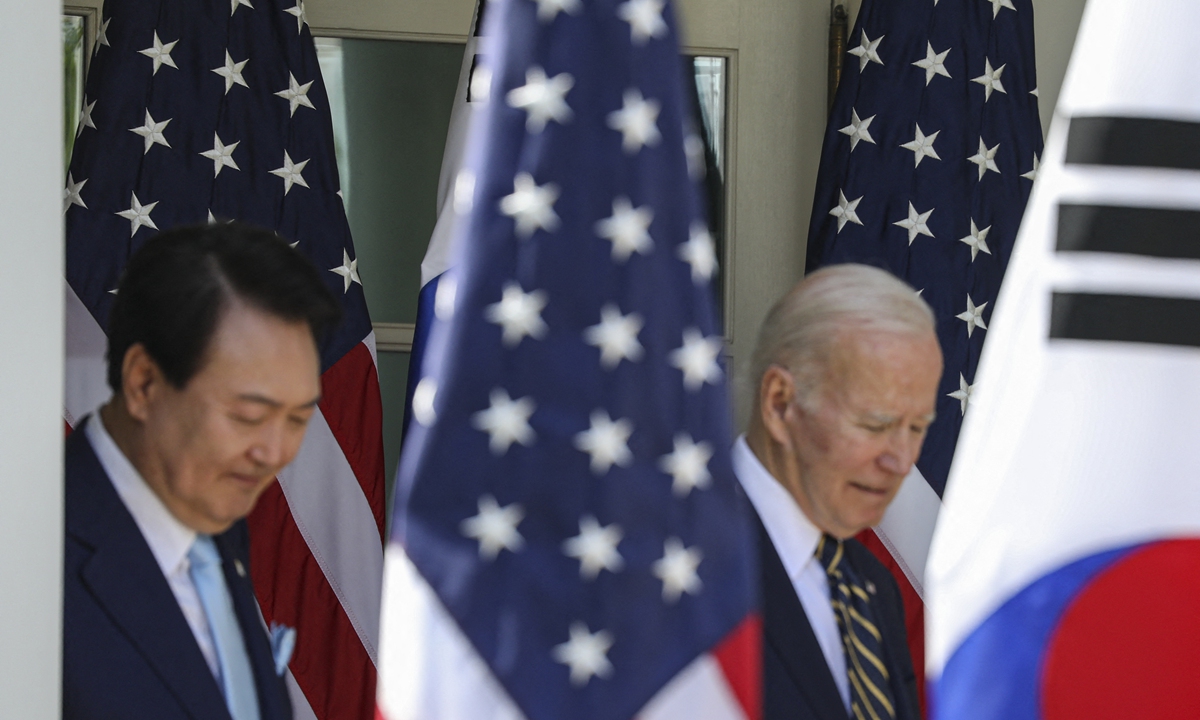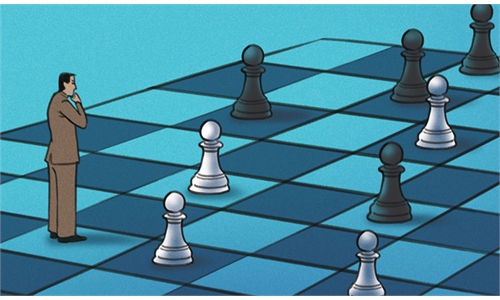
US President Joe Biden and South Korean President Yoon Suk-yeol hold a joint press conference at the White House in Washington D.C., US on April 26, 2023. Photo: IC
On April 27, South Korean President Yoon Suk-Yeol, who was on a state visit to the US, addressed a joint meeting of Congress. Judging from the content of his speech, it is clear that Yoon has already regarded the US as a leader and used the opportunity to please the US to the maximum. Considering the content of Yoon's speech and his performance in office over the last year, I would like to express a few opinions on Yoon's speech and the series of statements and actions he made during his visit to the US.Firstly, Yoon's constant gratitude, flattery and subservience to the US are actually based on a mistaken perception of Washington.
The fundamental purpose of US' so-called aid and protection of South Korea is not really for the benefit of South Korea but rather to maintain and pursue US national interests. South Korea is just a tool for the US to maintain and realize its own interests, but Yoon mistakenly sees it as US support and assistance for South Korea.
Take the impact of the Inflation Reduction Act and the CHIPS and Science Act on Korean companies that the Korean people and companies are particularly concerned about as an example. The fundamental reason that the US introduced these two bills is to serve "America First." As for the losses and impacts suffered by South Korean enterprises in the implementation of these two bills, Washington does not care and only offers lip service to them without taking substantive measures to solve the problem.
Just a week before Yoon's visit to the US, the US Treasury Department revealed which cars will be eligible for the new electric vehicle tax credits. None of the models produced by South Korean brands such as Hyundai and Kia were selected, while most of the eligible cars so far are made by the "big three" EV automakers in the US - Ford (F), General Motors and Stellantis - plus Tesla. South Korean companies are very worried, because the new regulations formulated on the source of raw materials, the manufacturing and assembly of battery components really make them fail to meet the requirement in a short period of time. As a result, the price competitiveness in the US will decline since the vehicles of South Korean car companies will not receive tax credits.
Similarly, at a time when US memory chip manufacturers in China are suspected of security risks and are under security review, the White House asked South Korea to urge its chipmakers not to fill any market gap in China, fearing that US companies will be squeezed and South Korea will take away the market share and profits that rightfully belong to the US. This is not only ignoring Seoul, but also making unreasonable demands on South Korean companies that do not conform to market norms and logic.
Although Yoon led a high-profile business delegation to the US, he did not reach any substantive agreement with the Joe Biden administration on core issues such as South Korean business investment, product sales, and technological upgrading related to the two bills. By giving Yoon a high-level state visit and other small gestures of formality, the US has satisfied his vanity, while encouraging him to continue to serve the interests of the US. It is unknown whether Yoon, who has been deceived by the US, will calm down after returning home, think and distinguish about the so-called promises and support given by the US, and deeply reflect on his mistaken perceptions.
Secondly, on issues such as freedom and democracy, although Yoon has emphasized their significance in a high-profile manner, he is practicing double standards in terms of domestic governance and specific policies.
Yoon seems to have a greater understanding and recognition of the importance of freedom and democracy than any previous South Korean president. In his inaugural speech, he mentioned the word "freedom" 30 times; in last year's Liberation Day speech, the word "freedom" appeared more than 30 times; and in his recent speech to the US Congress, the words "democracy" appeared more than 40 times.
Nevertheless, how does President Yoon govern and implement policies domestically? Taking the plan to compensate Koreans who performed forced labor during Japan's colonial rule (during World War II) as an example, in order to quickly improve relations with Japan and meet the expectations and demands of the US, the Yoon administration announced the compensation plan without communicating or reconciling with the victims, and without obtaining the support of the public, which has caused strong opposition and protests among the South Korean people. This goes completely against the "democracy" emphasized by Yoon. No wonder Yoon's approval rating has dropped below 30 percent. This is probably the strongest response from the South Korean people to Yoon's "willfully" use of power without respecting public opinion and observing the rules of the democratic system.
Thirdly, placing all of South Korea's security and development rights on the US and the South Korea-US alliance not only weakens South Korea's status and role, but more importantly, surrenders its national and ethnic independence and autonomy.
After overcoming the trauma of Japanese imperialism and war, South Korean people, relying on their perseverance and fighting spirit, have finally built a prosperous and wealthy country through generations of hard work. Although external factors have played a role in helping achieve these accomplishments, the main reason is that South Korea has had effective governance and a strong sense of autonomy among its people, allowing it to judiciously use favorable external conditions and environments to achieve its national development strategies.
However, it is precisely because South Korea has not yet escaped the influence and "control" of the US that, even though it has achieved "dazzling" accomplishments, its international status and image still suffer varying degrees of discounts and damages, which is directly related to South Korea's national positioning and relationship setting with the US.
After Yoon came to power, he proposed a development strategy to make South Korea a "global hub." This should have been a concentrated expression of South Korea's independence and autonomy, and should not be influenced or controlled by any external force. However, Yoon's approach of placing South Korea's security and development rights entirely on the US and the South Korea-US alliance is truly perplexing. South Korea could have taken an independent path based on its geographical advantages. Adopting a policy of siding with the US not only diminishes its position, but also deprives it of flexible space, which is undoubtedly a huge loss for national interests.
Yoon's thinking and approach actually expose his lack of confidence and independent consciousness. Moreover, it contradicts his development strategy of turning South Korea into a "global hub" country. Because in Washington's eyes, what they care about is whether South Korea can serve US national interests instead of whether South Korea could become a "global hub" country. Hence, to woo South Korea, the US will roll out the red carpet, making it mistakenly believe that the US is its "firm" ally.
Fourthly, Yoon's touted achievement of his visit to the US - the most effective extended deterrence guarantee given by the US - is filled with too much uncertainty and variables.
In the current deadlock of the denuclearization negotiation process and the ongoing tense confrontation on the Korean Peninsula, demanding substantial extended deterrence guarantees from the US holds significant meaning for Yoon's visit to the US, and is also one of the most pivotal achievements he can showcase domestically.
But according to the Washington Declaration, the so-called extended deterrence guarantee is hollow and lacks substantial content, once again exposing the US' "strict control" over South Korea. The establishment of the Nuclear Consultation Group (NCG) between South Korea and the US mentioned in the declaration is fundamentally different from the position and function of the Nuclear Planning Group in NATO, making it impossible to compare the two. Accordingly, there are many doubts and questions within South Korea regarding the establishment of the NCG. In particular, there are so many people who are skeptical about whether the group can play a substantial deterrent role and protect South Korea's security.
Moreover, US' promise to deploy a nuclear-armed submarine to South Korea, share strategy and information and conduct joint simulation exercises is not a new development. However, Yoon treasures this empty gesture like a precious gem, highly excited, believing that the Washington Declaration is the most important achievement of his visit, and that the guarantee given by the US can provide South Korea with sufficient security and protection.
In reality, the extended deterrence cannot protect South Korea, and instead has a negative impact on the current rock-bottom denuclearization negotiation and the escalating tension on the Korean Peninsula. Washington is using this consultation mechanism to control and influence the Yoon administration, making it obey US orders on nuclear issues.
Looking at Yoon's visit to the US, it seems that the US has given him enough face: high-level receptions, pageantry, and the release of the declaration, whereas Yoon actually received very little. From South Korea's perspective, this visit is not worth mentioning, and instead, Yoon's words and deeds to please and cater to the US have created risks and challenges for South Korea, while also impacting South Korea's status and national dignity, shocking the world and further deepening the impression that South Korea is a vassal of the US.
The author is a professor at the School of Government at the University of the Chinese Academy of Social Sciences and a researcher at the Institute of Information Studies at the Chinese Academy of Social Sciences. opinion@globaltimes.com.cn

